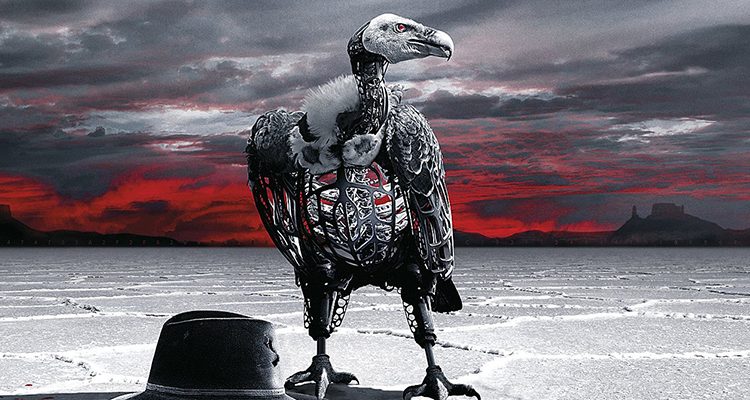
There is such a thing as living in fear, regardless of facts and the coldness and sterility of medical knowledge. Sometimes you need a warm hand to grab your hand and tell you that you can beat the odds. You need eyes to lock with you and you have to believe those eyes are connected to a mind that wants you to feel healthy. In watching Chernobyl, I felt that the Soviet Union was a pit, a very dirty place that covered its failure in lies used as armor against the encroaching bulldozer of American capitalism. It was a third world with no cable television, and you had to worry about the drinking water, and this was before what happened on April 26, 1986. What do you believe? That’s the question. If you read the New York Post a couple of days later, you would think about the stupid Communist government. They don’t have what we have. We take for granted what they worship. George Carlin once said that it’s called the “American Dream” because you have to be asleep to believe it.
I don’t know that his idea is completely accurate. We just have it better. We just have it exactly, perfectly right. We’re the farmers of fortune. By happenstance, in North America, in this time and place, we got lucky. Because of that, we look at Chernobyl and the Soviet Union as aberrations; anomalies that should not exist. If you lived in Ukraine, Pripyat before and after 1986, you are the misbegotten, the unlucky soul forced to confront a life of cancer and suspicious pain moving forward. There is no information or propaganda to be mined from Chernobyl. The story is told from the point-of-view of a spoiled American elite, as opposed to the proletariat, who might’ve had a more, if not realistic, at least insightful perspective. It may have been based on “remembrances,” but this is strictly an American product. It’s a story of a world going to hell. It goes bad in short order and it starts (hilariously) with a ball-buster of a boss — your supervisor who has problems with you, or maybe he hates his job, I don’t know. Imagine an enormous, frightening machine, but held together by rusted, rotting screws and bolts.

Whatever Chernobyl ultimately became, it had nothing to do with Mother Russia. It had everything to do with your jerk-ass boss who had an attitude problem with either you or his own immediate supervisor. Everybody’s got a boss in Mother Russia! At least that’s how the HBO mini-series would like the story to be told, and it is told beautifully in an ugly kind of way. I see it as ugly because the production would have me believe life in the Soviet Union is a dreary, State-run hell with a burning Sun in the freezing cold staring through stained, faded yellow curtains at a woman in a barren kitchen with nothing but potatoes and potable water to keep her company because her husband is a firefighter who is always on the job. She is lonely. Your Mother Russia is lonely, and she doesn’t inspire my confidence. The Soviet Union is the worship of the State and the State’s secrets. It didn’t help that, as Americans, we were subjected to passive manipulation the better part of 70 years by our government to condition in us an irrational hatred and fear of the Soviet Union.
They were looked upon as “The Evil Empire,” godless, reveling in misery and suffering and, in turn, hating us. This was tribal. When high-profile defections brought about an increase in our cultural understanding of our enemies before and after the events of Chernobyl, we got a better indication of life in the Soviet Union, the original “Other.” For the most part, Chernobyl is seen from the perspective of Valery Legasov (Jared Harris), an Atomic Energy scientist from Kurchatov who is brought in to assess the situation after Reactor 4 explodes. It’s a mess in more ways than one. The supervisor on duty during the explosion denies there is an explosion and denies that there are huge chunks of graphite scattered all about the power plant. The Government denies that the spike in radiation surrounding Pripyat is the result of a reactor explosion at Chernobyl. No one person accepts any culpability or blame. The firefighters handle the situation as though what happened was just a big fire, and no one seems to understand the natural tenacity of radioactive material.

Emily Watson plays a composite of a number of scientists who warn of radioactive clouds and poisoned groundwater. The only thing we can all be sure of is that everyone is being watched by agents from the KGB. Chernobyl is a horror show; a horror movie chopped into five episodes, the horror mini-series. It is real human terror. It makes Jason Voorhees and Jame Gumb look like a Sunday afternoon in the park. I looked at a video of real-life Chernobyl doctors taking the miniseries apart for slights in the misrepresentation of radiation sickness, and the true efficacy of iodine tablets. That’s not the point! The point was to demonstrate (sometimes in over-the-top fashion — as a movie should) a real-life horror. I don’t care that the shade of green on the shriveled skin of a first-responder was just a touch too green. I don’t care that Iodine is only effective at the peak of the poisoning and not before or after. Initially, Stellan Skarsgård’s character, Boris Shcherbina, is there to frighten his underlings out of spreading panic. Once he sees the danger of the reactor explosion, he is firmly on board to help Harris and Watson. How do you convince Gorbachev there is a real problem?
The more enlightened of us can see the humanity of Chernobyl. Unfortunately, this co-production of HBO and Sky Atlantic in the U.K. chooses to almost mock the Soviet Union, the people as well as their government. The characters who are not scientists or government operatives are seen as naive, gullible, and distracted, victims of constant propaganda. We know the reality. Wives love their husbands. Husbands love their wives. Parents love their children. They’re capable of joy in as equal a portion as despair. They hate themselves. They love themselves. They feel pride and embarrassment. They suffer and they prosper. They’re just like us. Chernobyl is a fine, well-made production that feels real in the use of excellent visual effects to recreate a tragedy. There is a moment that makes my heart sink where an engineer is told to survey the plant from the roof after the explosion. He does what he’s told, but he receives the equivalent of 10,000 chest X-rays. Firefighters think radiation is just a complex variation of a fire. As we watch Chernobyl, we’re constantly saying, “Leave! Leave the area! Get out!”

The only eyes I can use to watch Chernobyl are my eyes: American eyes. I couldn’t possibly even begin to understand the Soviet Union, the rusted machine falling apart when summoned to operate. All I know is my “American Dream.” I can have anything I want. I can say what I want. I don’t have to worry about government operatives visiting my home and threatening my family. I could never understand the people of the Soviet Union held in the sway of perverse politics and an economic system that crushes everyone. I can understand that people make mistakes. If a large-scale Chernobyl happened here, on my pristine shores, I know the reaction would be the same. We would be handed gritty fictions and reminded of our superiority. Chernobyl is a fine mini-series. It gives you a rudimentary understanding of the dangers of radiation. It preaches on the level of American-style propaganda of the failure of other government “experiments,” why our experiment works so much better while continuing to promote the stigma of nuclear power. The production received two Emmy awards for writing and direction, and they’re well-deserved.



